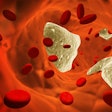The spread of a certain gum disease bacterium to the heart may exacerbate atrial fibrillation (A-fib), according to a news release dated May 9. It may represent a pathway that explains the relationship between periodontitis and atrial fibrosis.
Specifically, the bacterium Porphyromonas gingivalis (P. gingivalis) can enter the bloodstream and infiltrate the heart, increasing the risk of A-fib, according to the release from Hiroshima University.
“P. gingivalis invades the circulatory system via the periodontal lesions and further translocates to the left atrium, where its bacterial load correlates with the clinical severity of periodontitis,” Shunsuke Miyauchi, lead author and assistant professor at the university’s graduate school of biomedical and health sciences, said in the release.
For this study, researchers developed a mouse model to investigate how P. gingivalis might spread from the mouth and affect other organs. They divided 13-week-old male mice into one group that received the bacterium in the tooth pulp and a second group that remained uninfected. Both groups were then split into subgroups to observe cardiovascular risks at 12 and 18 weeks.
At 12 weeks, intracardiac stimulation tests showed no difference in A-fib risk between infected and uninfected mice. However, by week 18, infected mice were six times more likely to develop abnormal heart rhythms, with an A-fib inducibility rate of 30% compared to 5% in controls, according to the release.
Examining the mice's jaws, researchers found periodontitis markers, including tooth pulp decay and microabscesses while also detecting P. gingivalis in the heart’s left atrium, where stiff and fibrous tissue formed. Genetic testing confirmed the bacterium's presence in the heart tissue of infected mice, whereas uninfected mice had healthy teeth and heart tissue.
In the future, the research team hopes to improve collaboration between medical and dental professionals in Hiroshima Prefecture to advance cardiovascular care, according to the release.
“Periodontal treatment, which can block the gateway of P. gingivalis translocation, may play an important role in AFib prevention and treatment,” Miyauchi said.




















